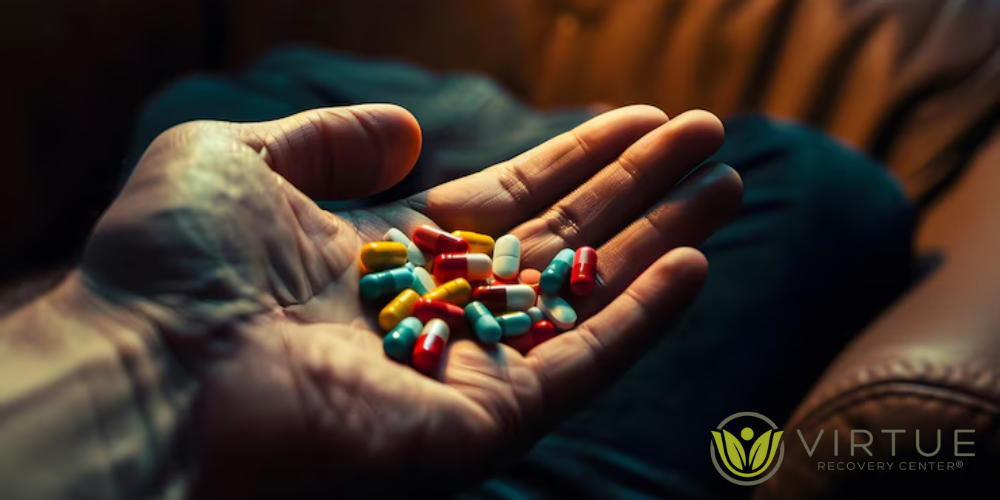Key Takeaways
- PTSD addiction often gets misdiagnosed since the signs of trauma and drug use can look identical.
- A lot of people use drugs or alcohol to deal with their PTSD symptoms, which can make them dependent.
- Finding and treating both the trauma and the addiction are necessary for proper care.
- Misdiagnosis can slow down recovery and make it easier for people to relapse over and over again.
- For healing to happen, trauma-informed care and specialized dual therapy methods are very important.
Introduction
PTSD addiction often confuses people because it combines mental and behavioral health issues. Nevertheless, many fail to recognize or properly identify both. As a result, those dealing with trauma may not receive the treatment they truly need.
A lot of people with PTSD use drugs or alcohol to treat themselves. Sadly, the substance misuse may hide the trauma behind, and, consequently, healthcare providers may not see the whole picture. For people to truly improve, they require an accurate diagnosis and comprehensive care.
What Exactly Is PTSD Addiction and Why Is It Overlooked?

When someone with PTSD develops a substance use issue, they experience what’s known as PTSD addiction. People often do this because they drink or use drugs to deal with flashbacks, nightmares, anxiety, or emotional numbness that come with PTSD.
Research from the National Center for PTSD backs up the link between trauma and addiction. It reveals that over half of those who are getting help for substance use also fit the criteria for PTSD.
People often don’t notice PTSD addiction because the symptoms are similar. According to the National Center for PTSD, more than half of individuals in substance use treatment also meet the criteria for PTSD. If you don’t do a trauma-informed screening, you can overlook the underlying issue.
Why Do Clinicians Often Misdiagnose PTSD Addiction?
Overlapping Symptoms
Changes in brain chemistry that affect mood, behavior, and decision-making are common in both PTSD and addiction. People with PTSD often have trouble sleeping, concentrating, and being overly alert. They also usually feel numb emotionally.
A provider could witness a patient in crisis and only diagnose substance abuse, not realizing that trauma is causing the behavior. As a result, treatment plans only focus on staying sober and don’t deal with the underlying issues.
Stigma and Mislabeling
Clinicians often wrongly label people with PTSD addiction as “noncompliant” or “resistant” to treatment. This stigma makes it hard for people to be honest about their drug use or trauma, especially veterans, abuse survivors, or persons with more than one mental illness.
In many cases, the person has never received adequate PTSD therapy or any trauma-informed support. If someone is in crisis, a rapid clinical assessment may, therefore, be more important than examining their emotional or historical background in detail.
Why Is an Integrated Diagnosis So Critical for Recovery?
To treat PTSD addiction properly, clinicians need to understand that the two conditions happen at the same time. If you treat PTSD and addiction separately, you can lose important information that can help you recover. That’s why an increasing number of people believe that integrated programs, which address both issues simultaneously, are the most effective approach.The VA Guidelines on Co-Occurring PTSD and Substance Use say that a trauma-first paradigm works well most of the time. It helps caregivers calm down the trauma reaction and lessen the need for drugs and alcohol as ways to deal with stress.
How Does Self-Medication Deepen the Addiction Cycle?

People often self-medicate when they have PTSD that isn’t being treated. People may drink alcohol to help them sleep or take medicines to forget about memories that keep coming back. This practice can become physically dependent over time, turning emotional avoidance into addiction.
According to a study published in PubMed Central, those with PTSD were three times more likely to develop substance use disorders. The more serious the trauma, the more likely the person was to use drugs or alcohol to deal with it.
What Are the Warning Signs of PTSD Addiction?
Some indicators could be:
- Using drugs or alcohol to “calm down” after bad dreams or memories
- Sudden disengagement from connections or duties
- More easily annoyed or angry, especially when sober
- Staying away from memories or places that remind you of trauma
- Relapses happen a lot when you’re stressed out
If any of these sound like you, you might need dual diagnosis care. Our anxiety treatment programs can also help people who are dealing with anxiety symptoms caused by trauma.
Why Trauma-Informed Care Matters
People with PTSD addiction require more than just standard therapy. They need understanding, support, and a sense of continuity. Clients feel protected, respected, and understood when they get trauma-informed care.
Clinicians who focus on trauma don’t re-traumatize their patients, ask the correct questions, and make therapy fit each person’s history. Additionally, addiction counseling may be used with treatments like cognitive processing therapy (CPT) or prolonged exposure.
Importantly, if you’ve been through trauma that hasn’t been dealt with, our trauma therapy program offers a clinically proven way to rehabilitate that doesn’t overlook the emotional agony that led to the substance use.
Why Is Dual Diagnosis the Key to Long-Term Healing?
To get better from PTSD addiction, you need to treat both at the same time. A dual diagnosis program makes sure that patients get psychiatric evaluations, trauma therapy, and substance use counseling all in one place.
This video on How Neurodivergence and Substance Use Disorder Overlap is a great way to learn about how PTSD and addiction can affect the brain and make recovery harder. Moreover, it discusses how trauma affects the brain.
Conclusion
PTSD addiction isn’t just two different problems that happen at the same time; it’s a very complicated problem that needs careful, all-around care. If you have the right diagnosis and therapy, you can get better, even if you have to wait longer to heal and suffer more.
Getting the appropriate diagnosis is the first step to long-term success in a personalized PTSD treatment service. To speak with our team at Virtue Recovery Killeen, please contact us or call 866-843-0545 today. We can help you figure out what to do next on your trauma-informed recovery journey.
Frequently Asked Questions
What Does It Mean to Be Addicted To PTSD?
PTSD addiction is when someone has both post-traumatic stress disorder and a substance use disorder, and the trauma makes them dependent on drugs or alcohol.
Why Do Doctors Often Get PTSD Addiction Wrong?
It’s challenging to figure out the fundamental cause of PTSD and substance abuse because their symptoms are similar.
What Are the Best Ways to Treat PTSD Addiction?
Integrated dual diagnosis treatment that includes therapy for both trauma and substance use, including CBT, is frequently the best way to go.
Can Outpatient Care Help Those With PTSD Addiction?
Yes, outpatient or partial hospitalization programs can be helpful, depending on the severity of the problem. Moreover, these programs enable patients to continue with their everyday activities.
Is Trauma Therapy an Element of Addiction Treatment?
Trauma therapy is a key part of many dual diagnosis programs that help people deal with the root causes of their problems with drugs and alcohol.
Resources
- U.S. Department of Veterans Affairs. PTSD and Co-Occurring Substance Use Disorders. National Center for PTSD.
https://www.ptsd.va.gov/professional/treat/cooccurring/index.asp - Jacobsen, Laurie K., et al. “Substance use disorders and posttraumatic stress disorder in patients with early childhood trauma.” PubMed Central, U.S. National Library of Medicine, 2016.
https://www.ncbi.nlm.nih.gov/pmc/articles/PMC4928573/ - U.S. Department of Veterans Affairs. PTSD and Substance Misuse.
https://www.ptsd.va.gov/understand/related/substance_misuse.asp - White, William L. Recovery from Addiction: A Developmental Model. PubMed Central, 2011.
https://www.ncbi.nlm.nih.gov/pmc/articles/PMC3181584/
- About the Author
- Latest Posts
Gigi Price holds licenses as a Master Social Worker and Clinical Drug Counselor. She completed her master’s degree in Social Work at Texas State University. Over the last decade, Gigi has been dedicated to utilizing evidence-based practices to enhance patient care and treatment planning, resulting in positive, long-term outcomes for patients and their families. Her passion lies in creating a treatment environment where professionals collaborate to bring about positive change and provide a safe, trustworthy therapeutic experience. Patients can be confident in receiving top-quality care under her leadership.
In her role as the Clinical Director of Virtue Recovery Houston, Gigi conducted research to identify the most effective approaches for treating patients with acute mental health diagnoses, PTSD, and Substance Use Disorder. She then assembled a team of skilled clinicians who could offer various therapeutic modalities, such as Cognitive Behavioral Therapy (CBT), Dialectical Behavioral Therapy
(DBT), Acceptance and Commitment Therapy (ACT), Somatic Exposure, Eye Movement Desensitization and Reprocessing (EMDR), and Cognitive Processing Therapy (CPT). Gigi takes pride in overseeing the development and implementation of Virtue Houston’s Treatment Program, which includes two specialized therapeutic curricula tailored to the unique needs of individuals struggling with mental health issues, addiction, and PTSD.












